Q&A: Why Does the Same Diamond Appear On Multiple Sites?

In today’s blog post, we answer a reader’s question on why the same diamond (with the same exact GIA certificate) can sometimes be found listed on the websites of different vendors. Is there something shady going on?
Read on to find out…
Question from reader: When doing a search for my engagement ring, I realized that the same diamond appears on multiple sites with slightly different pricings. I came to the conclusion after reviewing both listings that show the same exact GIA certification with diamond dimensions/proportions being identical.
By the way, here are the links to the above mentioned stones:
– 1.00 – Carat Round Diamond F Color VS2 Clarity – Blue Nile
– GIA Certified 1.00 Carat F-VS2 Excellent Cut Round Diamond – Enchanted Diamonds
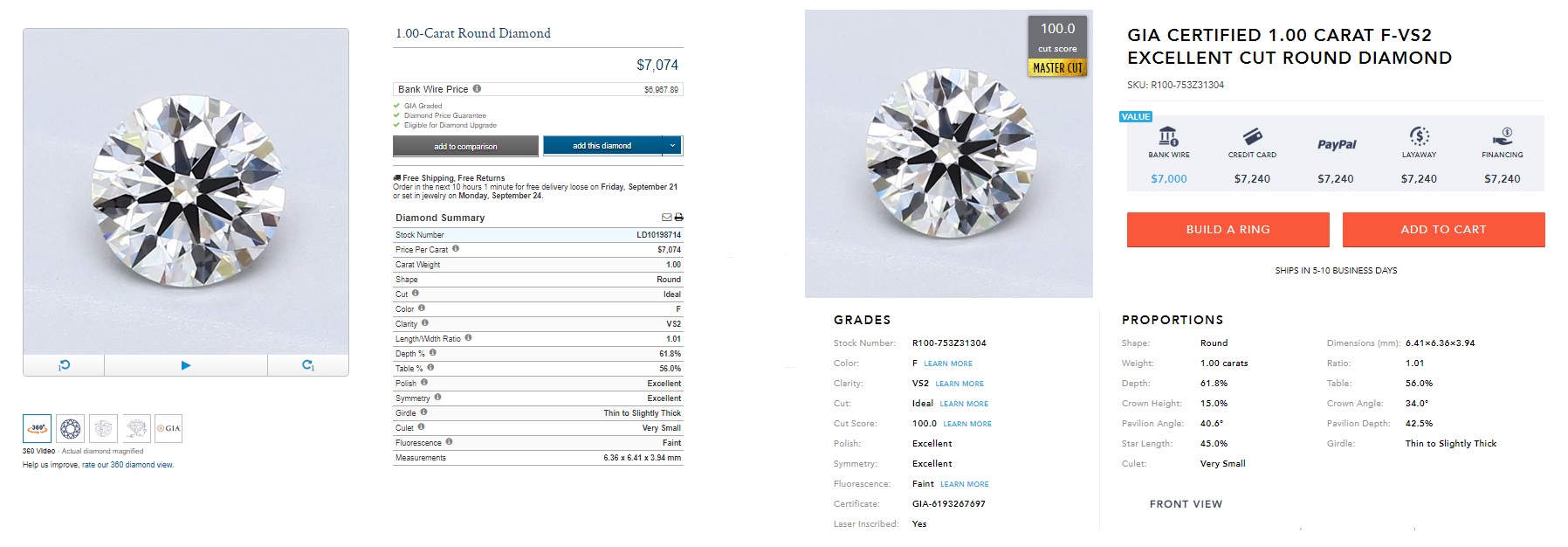
I’m pretty sure both these websites are selling the same diamond and it looks fishy to me.
How can a diamond exists concurrently in 2 locations or be owned by the different vendors at the same time? Imagine if I were to purchased it, how can I be assured that I will receive the actual diamond being listed? Could you shed some light on this?
Paul’s answer: Rest assured that both vendors are legit and what you have come across is nothing out of the norm. You see, most online vendors list a virtual inventory in which they do not own.
In fact, many physical brick and mortar stores also use the same process of using virtual inventories to sell diamonds they don’t physically have in store.
Instead, the actual diamonds are owned by a wholesaler who could allow several vendors to market the stone on their behalf. Different vendors (in your case, Blue Nile and Enchanted Diamonds) could work with the same wholesale suppliers and because of that, some stones in their inventories could sometimes overlap.
Why Do Vendors Use Virtual Listing Instead of Keeping Physical Stock?
One word: Cost.
With a virtual inventory, businesses do not have to worry about keeping stock or additional costs (e.g. security, insurance and shipping fees) incurred with keeping physical diamonds on hand.
For an online retailer, this reduces their operation costs and overheads significantly. In turn, the savings are passed onto the consumers as they get to enjoy much lower prices compared to buying in a brick and mortar store.
Using virtual inventories is a common practice in the online diamond industry and it actually benefits everyone along the pipeline.
Consumers get to cherry pick from a larger variety of stones and enjoy better prices. Vendors can offer better selections to meet specific needs of their clients and the wholesalers have more distribution points to move their inventory.
Sometimes, listings can get outdated if vendors are slow to update their latest status. As a result, inventory that had already been sold might still show up as being available.
So, if there’s a stone that you like or had short-listed, you might want to check in with the vendor on the diamond’s availability just to be sure.
Should You Always Go For the Cheapest Listing?
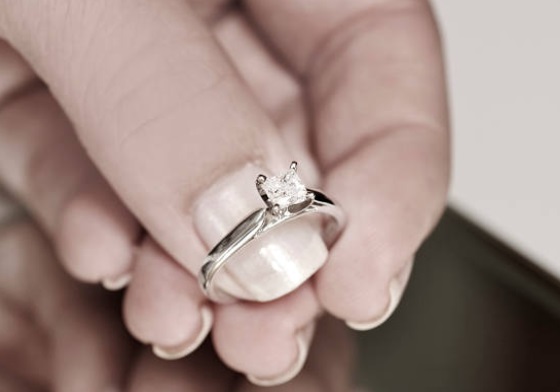
Since different vendors may have different markups and costs, they may be selling the same diamond for different prices. Based on my experience, this price variance can range from 1-10% and here’s where “small-minded” consumers often make mistakes.
Going for the cheapest listing to save a couple of hundred dollars doesn’t always mean it is going to be the best deal for you. More often than not, the dealers that offer the lowest prices end up costing consumers the most.
It is important to consider the products and policies that different companies offer. For example, is there an upgrade policy for your ring? Do they have a setting design that you like? Do they offer free value added services like future ring sizing? Do they offer routine maintenance for your jewelry? Do they have buy back policies?
The better vendors often go further by providing you with the ability to access their virtual inventory and offering value added services like magnified images, detailed videos and light performance data. Depending on their outfit, some may even be able to call in the stone for an in-house gemologist review on your behalf.
Related Articles
* This post has last been updated on 14th Sept 2018
Leave A Comment



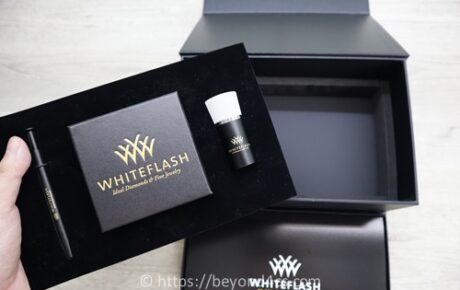





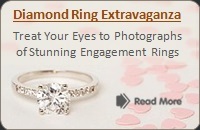
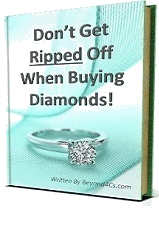

6 Comments
I experienced something similar with Blue Nile and B2CJewels. It seems like B2CJewels has lower pricing and your explanation of the wholesaler distribution makes sense. When the same diamond is sold on multiple sites, is it possible that a 2 consumers purchased the diamond at the same time and what happens in this case?
I’m based in Belgium Antwerp where diamonds are a big part of the economy here. Since both B2CJewels and BlueNile are distributors, is it possible for me to cut them out and buy directly from the wholesaler?
B2CJewels is no longer a vendor we can recommend in good faith given the string of bad experiences encountered by readers and us personally.
When 2 people buy the same diamond on different sites at the same time, what usually happens is that the vendor that is able to complete the transaction with the wholesaler first will get to sell the diamond to the client. It’s like a first come first serve basis. As for the other person, they will likely get a refund or credit depending on store policies. And this is one of the inconveniences that I had stated in the article above.
Now for your second question. The very definition of a wholesaler is that they deal in bulk and NEVER transact with consumers buying single stones. Anyone who does so is a RETAILER and not a wholesaler despite whatever gimmicky claims they may make about offering “wholesale” prices. It’s a farce.
In Antwerp, wholesalers are NOT allowed to sell a diamond to an individual. If they do, they are violating a code of conduct and most wholesalers won’t even bother wasting time on single sales because of legal, monetary and ethical reasons.
Which vendor would be the easiest to work with and do guaranteed buybacks in case I need to sell or upgrade my diamond ring in future? It’s not that I would want to sell my ring in future but having such policies would offer a peace of mind for any future uncertainty.
If you intend on selling your diamond ring in future, my advice is don’t even buy one to begin with. From my knowledge, the vendor with the most generous policies for consumers is High Performance Diamonds. They have a perpetual buyback policy in place and the most generous one I’ve ever seen.
If multiple online vendors list a diamond, would a jeweler likely have access to the same wholesaler and be able to get the diamond in to view, or do the wholesalers typically only ship sold diamonds? Is there some way to check which wholesaler has the diamond?
It’s easy to know which wholesaler owns the diamond and before you even ask the next question, let me just answer it beforehand.
No, wholesalers by definition will NOT sell directly to consumers. The real wholesalers (not those that claim they are by offering “wholesale prices”) will violate agreements and ethics if they do. They will not jeopardize their business standings with the retailers and put relationships at risk by selling a single diamond to some unknown consumer who knocks on their door. And there are plenty of other reasons as well especially when it comes to security.